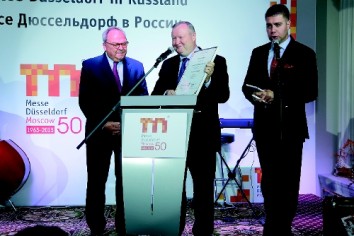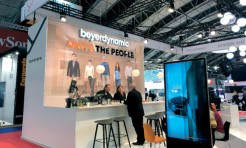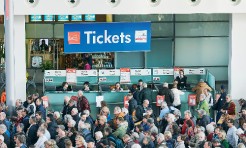Russia: Foreign presence is appreciated
In spite of the oil price plunge, high credit interest rates, and the tense
political situation, potential is still strong. Doing business in Russia,
however has become more difficult.

There is an acute need for investments in the Russian Federation and its neighbouring countries. Interest in modern machines, production plants, and high-tech materials continues to be strong. This applies to demand for packaging technology and equipment for plastics processing as well. Messe Düsseldorf was recently active in both of these segments: At the end of January it simultaneously organised the Upakovka/Upak Italia and Interplastica shows at the Expocentre in Moscow.
The presence of numerous foreign exhibitors was proof of the continuing great trust in the Russian market. “They demonstrated this with their participation in Upakovka/Upak Italia and in Interplastica,” says Werner Matthias Dornscheidt, drawing a positive conclusion in retrospect. “We are very satisfied in light of the current difficult conditions,” says the CEO of Messe Düsseldorf, commenting on the exhibitions held at Expocentre. Numerous visitors said they appreciated the presence of internationally active firms very much.

The financing of projects, however, has become extremely difficult. This makes it difficult for small and mid-sized companies. “Russian firms have serious problems due to the Rouble’s weakness and to the high interest on credits of 30 percent or more,” knows Vera Fritsche from the trade association Food Machines and Packaging Machines in the German Engineering Association (VDMA). “Some German manufacturers are therefore offering long-term clients their own financing plans.” According to a survey conducted in October among VDMA members, 70 percent admitted that the Russian crisis was having a serious effect in part on their business: less enquiries and contracts, postponed projects.
Vera Fritsche from VDMA evaluates the current situation with more nuances. “Even now there are many projects in the Russian market that promise many opportunities for German machine manufacturers.” The opinions of exhibitors participating at the two exhibitions organised by Messe Düsseldorf correspondingly differed, as two German companies reported. Supplier Hubert Gaisbauer felt the crisis noticeably: “Whoever does not have to absolutely invest now will wait to see how things develop,” observes the head of Gaisbauer Technical Solutions from Menden. “For us it was important to participate, nevertheless, in order to maintain contact with our clients and to demonstrate that we believe in the market.” Theo Aldenhövel from Langguth in Senden-Bösensell sees things more positively. “We had strong demand for our labelling machines at the exhibition,” reports the sales engineer during the Upakovka.
What role the current sanctions play is
difficult to judge. They have not fundamentally affected exports to the Russian
Federation. But what the final buyers do with the products is more closely monitored
– doing business in Russia has become more sluggish. This could have an effect
on future exhibitions. For example Metalloobrabotka: The German joint stand at
the metal processing exhibition in May 2015 will not reach the number of 135
exhibitors it had the previous year (www.messe-duesseldorf.de).
Author: Peter Borstel
This article was published in TFI issue 2/2015
Share in Facebook, Twitter or Google+:
TFI - Trade Fairs International - The International Trade Fair Magazine.
© 2006 - 2024 by TFI-Verlagsgesellschaft mbH. All rights reserved. TFI-Verlagsgesellschaft mbH shall accept no responsibility for the contents of external links and other contents.
TFI-Know-how
-
What to do when things go wrong at virtual or in-person events?

In the event world, it’s simply part of life if things don’t work out as planned.
-
How can networking be made to work at online events?

Networking typically happens at real, in-person events. But it’s also possible to do it online; it just works a little differently. There are various options available to organisers.
-
How can exhibitors stand out at trade fairs?

New products and a well-conceived stand design are not the only drivers for a successful presence. Many other factors are also important, but trade fair planners often lose sight of them.
-
How can industry decision-makers be reached online?

Trade fairs and trade fair companies need to constantly further develop, become more agile and flexible and offer services all year round. New, digital offerings are very important here. With its TrustedTargeting technology, Messe München offers its customers access to leading business-to-business decision-makers on the Internet.


